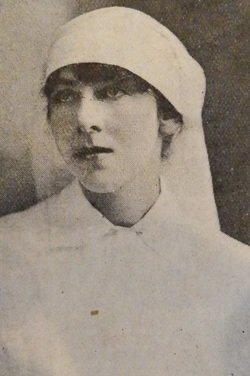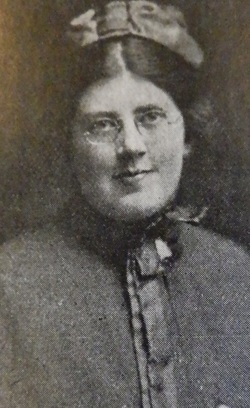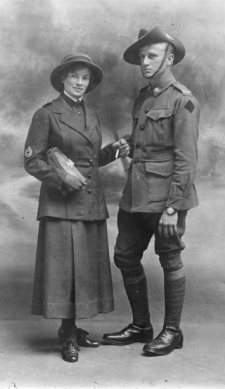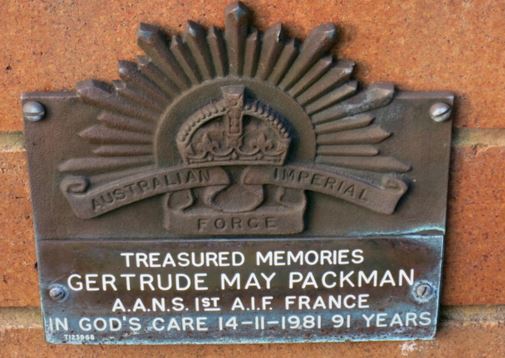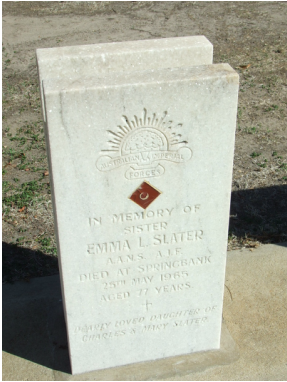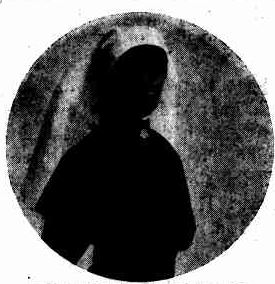SKELLY, Geraldine Agatha (Dene)
|
Sister
AANS Born 1889 in Echuca, Vic. Daughter of James SKELLY and Ellen nee LISTON Of ‘Greenvale’ Echuca, Victoria Occupation prior to enlisting: Nurse St. Vincents Hospital Enlisted 11 October 1915 Embarked 12 November 1915 from Melbourne per ‘Orsova’ Aged 26 years Served in Egypt & France Returned to Australia 7 August 1919 per ‘Themistocles’ Appointment Terminated 21 November 1919 Did not marry Died 27 May 1954 in Vic. Late of Toorak, Vic. Buried Echuca Cemetery, Vic. Punch Thursday 02 December 1915 page 20 |
SKIDMORE, Jean Gillies
Staff Nurse
AANS
Born 1886 in Lucknow, NSW
Sister of William Henry SKIDMORE and Isabealla nee McLINTOCK
Of West Wylong
Occupation prior to enlisting nurse
Resided Wollongong
Enlisted 8 December 1916 in Launceston, Tasmania
Embarked 26 December 1916 from Melbourne per ‘Mooltan’
Aged 30 years
Served in Bombay, India
Returned to Australia 16 February 1918 per ‘Raeburn’
Appointment Terminated 6 June 1918 due to marriage
Married Henry Moore BAKER
Died 03 November 1964 in Frankston, Vic.
Buried Macquarie Park Cemetery, NSW CHURCH OF ENGLAND, O11, Grave 0003
AANS
Born 1886 in Lucknow, NSW
Sister of William Henry SKIDMORE and Isabealla nee McLINTOCK
Of West Wylong
Occupation prior to enlisting nurse
Resided Wollongong
Enlisted 8 December 1916 in Launceston, Tasmania
Embarked 26 December 1916 from Melbourne per ‘Mooltan’
Aged 30 years
Served in Bombay, India
Returned to Australia 16 February 1918 per ‘Raeburn’
Appointment Terminated 6 June 1918 due to marriage
Married Henry Moore BAKER
Died 03 November 1964 in Frankston, Vic.
Buried Macquarie Park Cemetery, NSW CHURCH OF ENGLAND, O11, Grave 0003
SKIDMORE, Margaret
Sister
AANS
Born 1880 IN sHEPPARTON, Vic.
Daughter of William Henry SKIDMORE and Isabella nee McLINTOCK
Sister of J H FLOYD
Of Victoria
Occupation prior to enlisting Nurse
Resided Lucknow, NSW
Enlisted 4 December 1916
Embarked 9 June 1917 from Melbourne per ‘Mooltan’
Aged 36 years
Served in Salonika
Returned to Australia 14 September 1919 per ‘Canberra’
Appointment Terminated 18 October 1919
Moved to Queensland
Matron at Chillagoe General Hospital in 1920
Matron at Alpha Hospital until 1924
Matron at Foxborough Hospital, Toogoolawah near Brisbane
Married Arthur Leroy BAKER in 1927 in Qld.
Died 09 October 1949
AANS
Born 1880 IN sHEPPARTON, Vic.
Daughter of William Henry SKIDMORE and Isabella nee McLINTOCK
Sister of J H FLOYD
Of Victoria
Occupation prior to enlisting Nurse
Resided Lucknow, NSW
Enlisted 4 December 1916
Embarked 9 June 1917 from Melbourne per ‘Mooltan’
Aged 36 years
Served in Salonika
Returned to Australia 14 September 1919 per ‘Canberra’
Appointment Terminated 18 October 1919
Moved to Queensland
Matron at Chillagoe General Hospital in 1920
Matron at Alpha Hospital until 1924
Matron at Foxborough Hospital, Toogoolawah near Brisbane
Married Arthur Leroy BAKER in 1927 in Qld.
Died 09 October 1949
SKINNER, Ruby Winifred
|
Staff Nurse
AANS Born 3 January 1888 in Carlton, Melbourne, Victoria Daughter of William Archer SKINNER and Elizabeth nee ANGUS Of Tasmania Occupation prior to enlisting Nurse Enlisted 16 August 1915 at Austins Ferry Tasmania Embarked 24 August 1915 from Melbourne per ‘Morea’ Aged 27 years Served in Egypt & England Returned to Australia 16 April 1918 for Transport Duties per ‘Llanstephen Castle’ Re-embarked 9 November 1918 from Sydney per ‘Wiltshire’ Served in Bombay, India Returned to Australia 22 November 1919 per ‘Dunera’ Appointment Terminated 7 March 1920 Married Alwyn Francis SYDENHAM 12 January 1920 Died 21 January 1956 in Caulfield, Vic. Late of Caulfield, Vic. Cremated Springvale Botanical Cemetery 23 January 1956 Photograph Table Talk Thursday 16 September 1915 page 26 |
Sister Skinner, whose people resided at Ulverstone, is also back on a short furlough. She saw much service in Egypt in the Gallipoli days, and later went to France. Her only brother, Lieut. A A Skinner, who was invalided home from Gallipoli, and left again for France, was recently married in Edinburgh to Miss Margaret Cormack of Kirkhill House, Wick, Scotland.
Tasmanian Mail 02 May 1918 page 10 col 1
Tasmanian Mail 02 May 1918 page 10 col 1
SYDENHAM-SKINNER - On the 12th January at St. Andrew's Church of England, Alvie by the Rev. H.A. Hayden (late Chaplain-major AIF) Captain Alwyn Francis (17th Indian Cavalry Regiment) only son of Mr. and Mrs. G.F. Sydenham, of Colac, to Ruby Winifred (late AANS, AIF) elder daughter of Mr. and Mrs. W.A. Skinner, of Ulverstone, Tasmania.
The Australasian Saturday 28 February 1920 page 57
The Australasian Saturday 28 February 1920 page 57
SKYRING, Gertrude May
|
Staff Nurse
AANS Born 03 January 1890 in Bundaberg, Queensland Daughter of Charles Frederick SKYRING and Sophia Maud nee ROBINSON’ Of Bourbon St, Bundaberg, Queensland Occupation prior to enlisting Nurse Enlisted 10 May 196 Embarkation: 29 December 1916 from Sydney per ‘Themistocles’ Age: 27 years Served in France Returned to Australia: 16 May 1919 per ‘Shropshire’ Appointment Terminated: 29 June 1919 Married Reginald Arthur PACKMAN Died 14 November 1981 in Brisbane, Qld. Buried Mount Thompson Memorial Gardens Columbarium 12 Section 17 www.awm.gov.au A03296 |
SLACK, Jessie Elizabeth
Staff Nurse
AANS
Born 1878 in Rydal, NSW
Daughter of Thomas Samuel SLACK and Ann nee ADDISON
NOK: Sister: Margaret Kershan SMITH
Of Darlinghurst, Sydney, NSW
Occupation prior to enlisting Hospital Nurse
Enlisted 26 April 1915
Embarkation 15 May 1915
Aged 36 years
Served in Egypt, Lemnos, England & France
Returned to Australia: 13 November 1919 per ‘Pt Sydney’
Appointment Terminated: 12 January 1920
Married Ernest Peter FLETCHER in 1927
Resided 219 Ocean Street, Narrabeen
Mother of Eric, Rex, Cliff and Alan
Died 18 September 1963 in Manly, NSW
Buried Northern Suburbs Crematorium
Death notice from family state she was awarded Royal Red Cross and Queen's Medal
AANS
Born 1878 in Rydal, NSW
Daughter of Thomas Samuel SLACK and Ann nee ADDISON
NOK: Sister: Margaret Kershan SMITH
Of Darlinghurst, Sydney, NSW
Occupation prior to enlisting Hospital Nurse
Enlisted 26 April 1915
Embarkation 15 May 1915
Aged 36 years
Served in Egypt, Lemnos, England & France
Returned to Australia: 13 November 1919 per ‘Pt Sydney’
Appointment Terminated: 12 January 1920
Married Ernest Peter FLETCHER in 1927
Resided 219 Ocean Street, Narrabeen
Mother of Eric, Rex, Cliff and Alan
Died 18 September 1963 in Manly, NSW
Buried Northern Suburbs Crematorium
Death notice from family state she was awarded Royal Red Cross and Queen's Medal

Mentioned in despatches
Date of Commonwealth of Australia Gazette: 30 October 1919
Location in Commonwealth of Australia Gazette: Page 1656, position 35
Date of London Gazette: 11 July 1919
Location in London Gazette: Page 8835, position 73
Date of Commonwealth of Australia Gazette: 30 October 1919
Location in Commonwealth of Australia Gazette: Page 1656, position 35
Date of London Gazette: 11 July 1919
Location in London Gazette: Page 8835, position 73
NURSING IN FRANCE.
AN INTERESTING LETTER.
Sister Jessie E. .Slack, of the No. 2 General Hospital in Franco, writes as follows to her sister, Mrs. R. Lockrey,of Gollan, on the 17th February: —Sunday to-day, and having my day off I don't know where, the afternoon flies to. Nurse Bett and I went round to Mrs. Hammond at the Red Cross and got a book. She has lately opened a library for us, which is a treat. It turned bitterly cold, and 'tis no use going to the sitting room for there are always visitors, so we sneaked a bit of coal (get a scuttle full every two days)', and made a fire. We are learning to make ourselves very comfortable on active service. 'The Lord helps those,' etc., etc., is very true. Well,we put on our little kettle and made some tea. I was extravagant yesterday, I saw some beautiful brown eggs in the village at 4d, and bought some, so we fried one each in an enamel plate on our little stove, and having snared two pieced of bread, which we made into toast, we had a scrumptious afternoon tea. The eggs were beautifully fresh. As a rule the only eggs one sees, and they are few, are pickled,and one does tire, of the flavor. Today is the last day for selling cakes, and 110 chocolate after 1st inst. We sometimes get a small cake, but tlhey are dear — three or four francs for one the size of a small saucer. Summer should bring fruit, for I guess lots will be cut out. We are only really feeling it to any extent now — we are getting very strictly rationed. Lots of little comforts are entirely cut out. It make it very hard to make any change for sick men. You would laugh at the concoctions that go on in the day-room. We have a nice little room, and the boys make all sorts of queer baked puddings and savories. Every scrap of bread crust is used up, likewise any rice, etc. The men like them. Often the only sweetening is a couple of spoonsful of jam. We used to get lots of golden syrup, but that is nearly cut out. Have just been up to tea, but the tables are full, so shall have to wait for second tea. One of the divisions is out resting, so when ever the boys got a chance they come in. This lot has been Very good. Gave two days sports last week, and asked the sisters out. Of course only a limited number could go. The second day was horse events, etc., but it rained and spoilt - things. The 'wards are fairly light, so they made extra efforts and let several girls off for the day — had great fun going in a lorry — had to cut outside Boulogne, for we are not supposed to 'lorry.' We had an awfully nice time, a very nice dinner, etc. Headquarters at some French Duchess' chateau (she is doing Red Cross work). Then on Friday several were asked out again to dinner and a motor sent. Have just been reading your last letter, December 11, and you talk of flowers. I am very 'bush sick' this week, shall apply soon for transport. Have been extravagant this week, and bought some pretty flowers for the ward arid my room but, oh, it gives such pleasure. Have some little white snowdrops, wattle and some most beautiful pink carnations in here. For the ward I got some pink carnations yesterday and last week yellow daffodils, yellow jonquils and freezias — not many of course, but they do take the bareness off, and the boys love them. I put the daffodils by the side of a very sick Sydney boy, he goes home, poor boy, less one leg, and nearly lost his life. I have not many patients in my ward, but they are all heavy dressings. I can't remember whether I sent you a postcard from Aberdeen or not (when on holiday). Our time, flew very quickly. We had mapped out quite a trip, but cut it short. Nurse Bett and her friend met in Edinburgh but we found that the trains were very erratic. Got up. there about 8 a.m. The next train to Aberdeen was 1.7 p.m., and no more until an unearthly hour next a.m., and one on Sunday, so we did Edinburgh in a flash and caught the 1.7 train, and had lunch on board. It was a horribly windy day, and the gardens everywhere were very bare and bleak, so I was not keen on staying. We saw the old castle and Holyrood Palace, Scott's monument, and passed John Knox's house, and saw the old Closes. I should love to go there in summer. Wce got to Aberdeen some where about 8 p.m. and found a nice little quiet hotel — the Caledonia. They were good to us. Aberdeen is a pretty place. The old RiVer Ness flows through it, and the old field of Culloden, whore Charlie Stuart was routed, is only five miles from there. We went out by train and took some sandwiches with us, and then walked back. I must send you a postcard. The English are buried in one field in one mound, and very terse wording on the stone, something to the effect that 'Here lie the English.' In the other field are the different mounds of the different clans, with just a rough stone at the head of each. 'Here lie Clan 'Stewart,' 'Here lie Clan McGregor, ' ' etc. The Mcintosh was quite a big mound, so guess a few must have served in the, cause. I plucked some faded heather off it. It was all night travelling in the train, so I indulged in a Sleeper as our fares cost nothing, and had to cross next day. It was nearly 9.30 a.m. before the train got to Euston — it was very late. There I had to go to Charing Cross about my passage and report at Headquarters. They are so deadly slow, it took nearly all morning. We had beautifully mild weather all my holiday, and crossing over was bitterly cold, but calm. It was 7.30 before I got back here. Have been in a heavy surgical ward since I came back, and am to have charge of it tomorrow for a week. Sister is to go on eight days' Paris leave, at least, we are getting that extra, we have fought for it for a long time. Don't know if we shall still be able to entertain the boys as before, as they have put a stop to dancing. However that remains to be seen. This week has been so cold, yesterday and today have been absolutely bitter frosts, but sunny days with keen air. Old Fritz has been getting his wings again.
Wellington Times Thursday 09 May 1918 page 5
AN INTERESTING LETTER.
Sister Jessie E. .Slack, of the No. 2 General Hospital in Franco, writes as follows to her sister, Mrs. R. Lockrey,of Gollan, on the 17th February: —Sunday to-day, and having my day off I don't know where, the afternoon flies to. Nurse Bett and I went round to Mrs. Hammond at the Red Cross and got a book. She has lately opened a library for us, which is a treat. It turned bitterly cold, and 'tis no use going to the sitting room for there are always visitors, so we sneaked a bit of coal (get a scuttle full every two days)', and made a fire. We are learning to make ourselves very comfortable on active service. 'The Lord helps those,' etc., etc., is very true. Well,we put on our little kettle and made some tea. I was extravagant yesterday, I saw some beautiful brown eggs in the village at 4d, and bought some, so we fried one each in an enamel plate on our little stove, and having snared two pieced of bread, which we made into toast, we had a scrumptious afternoon tea. The eggs were beautifully fresh. As a rule the only eggs one sees, and they are few, are pickled,and one does tire, of the flavor. Today is the last day for selling cakes, and 110 chocolate after 1st inst. We sometimes get a small cake, but tlhey are dear — three or four francs for one the size of a small saucer. Summer should bring fruit, for I guess lots will be cut out. We are only really feeling it to any extent now — we are getting very strictly rationed. Lots of little comforts are entirely cut out. It make it very hard to make any change for sick men. You would laugh at the concoctions that go on in the day-room. We have a nice little room, and the boys make all sorts of queer baked puddings and savories. Every scrap of bread crust is used up, likewise any rice, etc. The men like them. Often the only sweetening is a couple of spoonsful of jam. We used to get lots of golden syrup, but that is nearly cut out. Have just been up to tea, but the tables are full, so shall have to wait for second tea. One of the divisions is out resting, so when ever the boys got a chance they come in. This lot has been Very good. Gave two days sports last week, and asked the sisters out. Of course only a limited number could go. The second day was horse events, etc., but it rained and spoilt - things. The 'wards are fairly light, so they made extra efforts and let several girls off for the day — had great fun going in a lorry — had to cut outside Boulogne, for we are not supposed to 'lorry.' We had an awfully nice time, a very nice dinner, etc. Headquarters at some French Duchess' chateau (she is doing Red Cross work). Then on Friday several were asked out again to dinner and a motor sent. Have just been reading your last letter, December 11, and you talk of flowers. I am very 'bush sick' this week, shall apply soon for transport. Have been extravagant this week, and bought some pretty flowers for the ward arid my room but, oh, it gives such pleasure. Have some little white snowdrops, wattle and some most beautiful pink carnations in here. For the ward I got some pink carnations yesterday and last week yellow daffodils, yellow jonquils and freezias — not many of course, but they do take the bareness off, and the boys love them. I put the daffodils by the side of a very sick Sydney boy, he goes home, poor boy, less one leg, and nearly lost his life. I have not many patients in my ward, but they are all heavy dressings. I can't remember whether I sent you a postcard from Aberdeen or not (when on holiday). Our time, flew very quickly. We had mapped out quite a trip, but cut it short. Nurse Bett and her friend met in Edinburgh but we found that the trains were very erratic. Got up. there about 8 a.m. The next train to Aberdeen was 1.7 p.m., and no more until an unearthly hour next a.m., and one on Sunday, so we did Edinburgh in a flash and caught the 1.7 train, and had lunch on board. It was a horribly windy day, and the gardens everywhere were very bare and bleak, so I was not keen on staying. We saw the old castle and Holyrood Palace, Scott's monument, and passed John Knox's house, and saw the old Closes. I should love to go there in summer. Wce got to Aberdeen some where about 8 p.m. and found a nice little quiet hotel — the Caledonia. They were good to us. Aberdeen is a pretty place. The old RiVer Ness flows through it, and the old field of Culloden, whore Charlie Stuart was routed, is only five miles from there. We went out by train and took some sandwiches with us, and then walked back. I must send you a postcard. The English are buried in one field in one mound, and very terse wording on the stone, something to the effect that 'Here lie the English.' In the other field are the different mounds of the different clans, with just a rough stone at the head of each. 'Here lie Clan 'Stewart,' 'Here lie Clan McGregor, ' ' etc. The Mcintosh was quite a big mound, so guess a few must have served in the, cause. I plucked some faded heather off it. It was all night travelling in the train, so I indulged in a Sleeper as our fares cost nothing, and had to cross next day. It was nearly 9.30 a.m. before the train got to Euston — it was very late. There I had to go to Charing Cross about my passage and report at Headquarters. They are so deadly slow, it took nearly all morning. We had beautifully mild weather all my holiday, and crossing over was bitterly cold, but calm. It was 7.30 before I got back here. Have been in a heavy surgical ward since I came back, and am to have charge of it tomorrow for a week. Sister is to go on eight days' Paris leave, at least, we are getting that extra, we have fought for it for a long time. Don't know if we shall still be able to entertain the boys as before, as they have put a stop to dancing. However that remains to be seen. This week has been so cold, yesterday and today have been absolutely bitter frosts, but sunny days with keen air. Old Fritz has been getting his wings again.
Wellington Times Thursday 09 May 1918 page 5
EXPERIENCES OF A NURSE
LETTER FROM MRS. R. LOCKREY'S SISTER.
Mrs. R. Lockrey, of Gollan, has received the following letter from her sister, Nurse Jessie E. Slack, who has been nursing on the other side for along time. It is dated from London, July 27, 1919:--I suppose you are wondering when you will see me back, but expect it will only be a matter of a few more weeks before we are on the briny again. I wrote you from Bristol, where I was doing a three months' course of "non-military" duties. We had a very nice time there, and got very good marks. We left there on 18th, and report back to our Matron-in-Chief on 29th inst., so I am having 10 days free. I feel that I am due for them, for a girl who sticks to her guns and does not take an hour off for sickness, gets no more consideration than one who 'goes sick' on the least excuse, so I'm getting to be a hardened war-worker. We came right up from Bristol on Friday night in time for the Peace Celebrations on Saturday. Luckily for us we were able to get rooms at this hostel, or I don't know what we would have done, as London is full. Arrived at Paddington we could hardly get a taxi, but after waiting ages we shared one with two other ladies who were going to Piccadilly. That was on our route, and we had a decent taxi driver, a demobolised man. He brought us up and round part ofthe decorated route. It looked very beautiful in the twilight, and the long column of statues from Marble Arch, were very pretty indeed in their freshness. At each corner was a group offour figures taken from the Army and Navy, and hovering over a figure of 'Peace,' and then further down another figure, very beautiful, representing 'Peace and victory,' her two feet firmly planted on the world, and in her hands a wreath of laurel. These figures, of course, were in white plaster, and placed at intervals along each side of part of Oxford street. Long garlands of green laurel leaves were hung right along, and that with the grouping of the flags was most effective. Then again, everywhere was gay with bunting and large flags, and I may tell you that among them, and placed inmost conspicuous places, was our blue and starred flag of Australia. Almost all the big business places were beautifully decorated and illuminated, so you can imagine how festive it all looked. Not withstanding the hundreds of sad hearts, the huge crowds were very happy. Everyone looked so good natured, and one seldom saw anyone the worse for liquor, and then he was only 'merry.' It was just the same all day Saturday and Saturday night. I believe that heaps of people stayed all night to secure a seat next day for the procession. Some of our girls had an excellent view, but needless to say, they had men with them, and Aussies at that, and they are fairly resourceful. I had a very good view, but it was only towards the tail-end, but, still there were thousands more there besides. The fireworks at night were beautiful. I wish you could have seen them. I would love to have heard the massed choir at 7 p.m., but we had to come home for some food, as it was impossible to get anything out. We brought some food with us from Bristol for our lunch, but in her excitement, Miss Taylor, threw it away. I hope that you people have had a pretty decent season, and that the dreaded 'flu has abated. It should die out as winter ends. It was the same over this side. I really expect that we will all be back by the end of the year. Although the boats seem to be slow in getting away, it is wonderful how many thousands of troops have left lately. We will get back to the heat of summer again, so tell the boys to be sure and save some watermelons for Auntie. I expect I shall hardly know the children, they will have grown so — nearer five years than anything else. We have such a pretty park in front of this square. Like the most of these squares the house holders rent it, so that it is not open to the general public. This afternoon, Sunday, there have been such family parties there. I expect we shall miss all the fresh English greenness when we leave it. Can you imagine travelling for miles on the railway through nothing but green fields, and actually no dust. I could not help comparing it with home. The people here are so comfortable and cosily padded, that they don't know that they are alive. Yet I have enjoyed my summers here immensely. I shall be disappointed if I don't get my 14 days leave, for I have planned a flying trip to Scotland. The heather will be in bloom now, and I want to do the Trossachs. That is the country that Sir Walter Scott writes so much about.
Wellington Times Thursday 16 October 1919 page 2
LETTER FROM MRS. R. LOCKREY'S SISTER.
Mrs. R. Lockrey, of Gollan, has received the following letter from her sister, Nurse Jessie E. Slack, who has been nursing on the other side for along time. It is dated from London, July 27, 1919:--I suppose you are wondering when you will see me back, but expect it will only be a matter of a few more weeks before we are on the briny again. I wrote you from Bristol, where I was doing a three months' course of "non-military" duties. We had a very nice time there, and got very good marks. We left there on 18th, and report back to our Matron-in-Chief on 29th inst., so I am having 10 days free. I feel that I am due for them, for a girl who sticks to her guns and does not take an hour off for sickness, gets no more consideration than one who 'goes sick' on the least excuse, so I'm getting to be a hardened war-worker. We came right up from Bristol on Friday night in time for the Peace Celebrations on Saturday. Luckily for us we were able to get rooms at this hostel, or I don't know what we would have done, as London is full. Arrived at Paddington we could hardly get a taxi, but after waiting ages we shared one with two other ladies who were going to Piccadilly. That was on our route, and we had a decent taxi driver, a demobolised man. He brought us up and round part ofthe decorated route. It looked very beautiful in the twilight, and the long column of statues from Marble Arch, were very pretty indeed in their freshness. At each corner was a group offour figures taken from the Army and Navy, and hovering over a figure of 'Peace,' and then further down another figure, very beautiful, representing 'Peace and victory,' her two feet firmly planted on the world, and in her hands a wreath of laurel. These figures, of course, were in white plaster, and placed at intervals along each side of part of Oxford street. Long garlands of green laurel leaves were hung right along, and that with the grouping of the flags was most effective. Then again, everywhere was gay with bunting and large flags, and I may tell you that among them, and placed inmost conspicuous places, was our blue and starred flag of Australia. Almost all the big business places were beautifully decorated and illuminated, so you can imagine how festive it all looked. Not withstanding the hundreds of sad hearts, the huge crowds were very happy. Everyone looked so good natured, and one seldom saw anyone the worse for liquor, and then he was only 'merry.' It was just the same all day Saturday and Saturday night. I believe that heaps of people stayed all night to secure a seat next day for the procession. Some of our girls had an excellent view, but needless to say, they had men with them, and Aussies at that, and they are fairly resourceful. I had a very good view, but it was only towards the tail-end, but, still there were thousands more there besides. The fireworks at night were beautiful. I wish you could have seen them. I would love to have heard the massed choir at 7 p.m., but we had to come home for some food, as it was impossible to get anything out. We brought some food with us from Bristol for our lunch, but in her excitement, Miss Taylor, threw it away. I hope that you people have had a pretty decent season, and that the dreaded 'flu has abated. It should die out as winter ends. It was the same over this side. I really expect that we will all be back by the end of the year. Although the boats seem to be slow in getting away, it is wonderful how many thousands of troops have left lately. We will get back to the heat of summer again, so tell the boys to be sure and save some watermelons for Auntie. I expect I shall hardly know the children, they will have grown so — nearer five years than anything else. We have such a pretty park in front of this square. Like the most of these squares the house holders rent it, so that it is not open to the general public. This afternoon, Sunday, there have been such family parties there. I expect we shall miss all the fresh English greenness when we leave it. Can you imagine travelling for miles on the railway through nothing but green fields, and actually no dust. I could not help comparing it with home. The people here are so comfortable and cosily padded, that they don't know that they are alive. Yet I have enjoyed my summers here immensely. I shall be disappointed if I don't get my 14 days leave, for I have planned a flying trip to Scotland. The heather will be in bloom now, and I want to do the Trossachs. That is the country that Sir Walter Scott writes so much about.
Wellington Times Thursday 16 October 1919 page 2
SLATER, Emma Lousia
|
Staff Nurse
AANS Born 18 February 1888 at Cookes Plains, SA Daughter of Charles Edwin SLATER and Mary nee HUNT Of Mundalla, South Australia Occupation prior to enlisting Nurse Enlisted 6 August 1915 Embarked 6 August 1915 from Adelaide per ‘Orontes’ Aged 28 years Served in Egypt, France & England Returned to Australia 8 February 1920 per ‘Pt Napier’ Appointment Terminated 9 April 1920 Did not marry Died 25 May 1965 at Springbank, SA Aged 77 years Resided Walkerville, SA Buried West Terrace Cemetery Kendrew Oval |
SLATER, Muriel Matthew
|
Staff Nurse
AANS Born 1892 in Kew, Melbourne, Vic. Daughter of George SLATER and Emily Maud nee WHINYATES Of 6 Lambeth Place, East St. Kilda. Victoria Occupation prior to enlisting Nurse Trained at Ballarat Hospital Enlisted 7 May 1917 Embarked 29 May 1917 from Melbourne per ‘Khiva’ Aged 25 years Served in Bombay, India & England Returned to Australia 12 June 1919 per ‘Karagola’ Appointment Terminated 13 July 1919 Married Thomas Hallett SCHOEFIELD (MC MM) in Ballarat in 1922 Died 1983 in Malvern, Vic. Cremated Springvale Botanical Cemetery and remains collected Graphic of Australia Friday 27 July 1917 page 14 |
